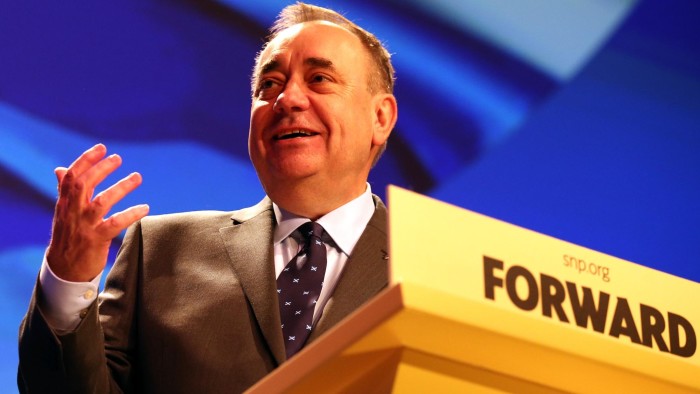Independent Scotland would engage with EU, says Salmond

An independent Scotland would be an “enthusiastic, engaged and committed” member of the EU – in sharp contrast with the UK’s often “sullen, disengaged” approach, Scottish first minister Alex Salmond has told an audience at the College of Europe.
In a speech intended to build support ahead of Scotland’s September 18 independence referendum, Mr Salmond said a “virulent strain of europhobia” was responsible for the referendum proposed by David Cameron, UK prime minister, on whether the UK should leave the EU.
“Scotland will make proposals about the type of Europe we want to be part of; the UK government is considering whether it wants to be part of Europe at all,” he told students and journalists on Monday at the college, a training academy for senior EU officials.
New research commissioned by the University of Edinburgh supports the view that Scots are markedly more positive about Europe than people in England. The YouGov poll found 48 per cent of respondents in Scotland would vote to stay in the EU in an in-out referendum with 32 per cent voting to leave. Voters in England favoured an EU exit by 40 per cent to 37 per cent.
The YouGov poll also suggested 30 per cent of voters in England intended to back the Eurosceptic UK Independence party in European elections next month, compared with just 10 per cent in Scotland.
But the first minister was vague in response to questions on how an independent Scotland would negotiate representation in the European parliament and how it could join without signing up to the euro, a precondition for new EU members
Mr Salmond, who was last year forced to abandon claims an independent Scotland would automatically be an EU member, insisted Scotland could negotiate “continuing membership” before its proposed independence day in March 2016.
He said there was no legal basis for revoking EU citizenship from Scotland’s 5.3m inhabitants and it would be “absurd” to force it to leave only to immediately reapply.
“Scotland will ask for continued membership on the basis of ‘continuity of effect’ and at no detriment to other members,” he said.
Pro-union campaigners and some European leaders and officials have said Scottish membership could be difficult or even impossible to negotiate. The UK government has said Edinburgh would certainly lose the benefit of the budget rebate and other advantageous treatment enjoyed by the UK.
William Hague, UK foreign secretary, told the first minister in a letter ahead of his address that his proposal for ongoing EU membership was “far from certain” and asked him to spell out a “Plan B” if he could not convince other member states to agree.
Instead, Mr Salmond contrasted Scotland’s enthusiasm for the EU with the sullen Westminster voices that had often dominated UK policy since the time in office of former prime minister Margaret Thatcher.
“Too much of the debate on this new Europe at Westminster, is being distorted by dreams of an old empire,” he said. “Those dreams have little allure now for Scotland.”
The first minister indicated a number of reforms he would promote in the EU, including allowing member states to set higher minimum wages in public sector contracts and improving the “quality and sensitivity” of EU governance, a step he said could be taken without revising the EU’s founding treaties.
Comments